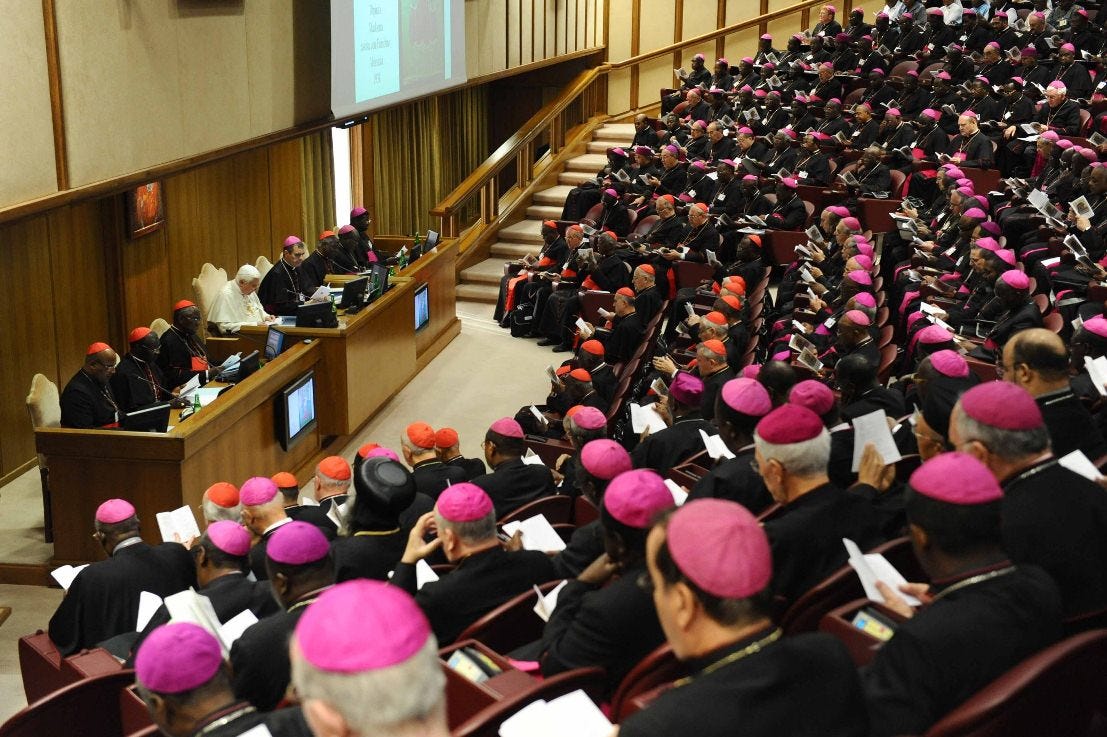Ruminations on a Synod (2)
CHURCH & MISSION: Further Thoughts on the Synod on the New Evangelisation
PART TWO: Some ruminations prompted by reading the Lineamenta for the synod on the New Evangelisation (September 2012)
You might like to first read PART ONE.
A Strategy of Attraction
It is not enough that the faith be true, it must presented in a way that does not obscure its attractiveness. This is not something superficial.
The attraction is not only towards the easy things, it can also attract people towards the challenge.
Many people long to give their lives to something bigger than themselves, a cause worth giving everything for.
To Give and Not Receive
However, there is a fear that we will give and not receive. Although someone mature and ‘hardened’ in the faith might recognise this as the challenge of Christian life, and not be deterred, such a perception can have a significant deterrent effect on those not mature in the faith, and also on some who are fairly mature but weary from effort that seems to have yielded little return.
So it has a big relevance to evangelising strategy.
Who is going to sign up for a life of duty disproportionate to joy?
So there are initial challenges regarding perceptions. These are only likely to be overcome experientially, but can at times also be overcome by someone particularly gifted in persuasion, who can make things seem attractive in prospect. In any case, some of that is usually needed to get people to take a first step to try the experience we believe they will respond to if only they are willing to give it a try.
What are the points of attraction?
If there was a really loving, joyful community people would be attracted to that. But usually we feel we do not have that as our starting point.
Maybe it is just a few people who have a belief but do not feel that what they have to offer will be recognised as all that appealing.
Not only that, although we might imagine some attractive experiences that could be developed with some effort, they seem a bit ‘stand alone’ so even if we get people to respond to them we are not sure what the next steps are. Or we can offer some attractive things but cannot work out how they reveal something about God in Christ, let alone about the Church. It is hard to develop a systematic pathway towards recognition of Christ. We might be able to devise versions of this but not ones that people seem attracted to.
A tried and tested method that can still work, if you can get people to give it a go, is a community-building faith-sharing retreat experience.
An attractive way of presenting the faith, or some aspects of it, can be an effective starting point. But it is difficult to work out how to sustain the initial interest and momentum so as to lead people by well paced enjoyable steps deeper into a recognition of Christ.
Such initial experiences need to come out of the life of at least a small group who have experienced the joy of Christian community, and who provide the nucleus for a new community, or a sustained accompaniment into an existing community.
There is so little tangible Christian community available nowadays for people to experience that these ‘retreat’ experiences are not really retreats, that is, faith renewal experiences. They are not so helpfully conceived as refreshers in faith, after which people return to their Christian life renewed to carry on. They have no pre-existing Christian life of the desired kind to return to.
This is not being judgemental on people’s genuineness, but a recognition that many Catholics now could more accurately be described as having some elements of a Christian life, but not a tangible, effective, integrated way of life that is effectively Christian as a whole. That which people feel as a lack nowadays is the integration of life.
We need to ask, what do people experience as providing the simplifying centre of their lives?
It is this simplifying centre that refreshes and nourishes. It is what we desire as a balancing core for a life otherwise fragmented in busyness and complexity.
If the Church can effectively provide for people such a simplifying, renewing core in the experience of their lives many will be attracted.
Being Loved First
This points to the priority of the experience of being loved. Yes, we are also called to give love to others, but we need to experience being loved first. This is what centres us and gives us the feeling of freedom. This then releases the energy to give love.
Although Christians might sometimes lament the drift of people from Christian truth and values, implying that such people are slack and lacking, the subjective experience of the people drifting away is quite often that their own conscientiousness is a burden. They feel they are weighed down by their duties, not slackers at all, but engaged in things of more urgency and importance than the kinds of things the church seems to be doing.
The Gospel will sound and feel like good news if it lifts burdens.
One of those burdens that is heavy nowadays, and hard for people to clearly articulate, is the lack of a simplifying centre. Part of this burden comes from the deficit of intelligibility in the modern-postmodern worldview, and the social structures and cultural forms that are deformed by it. In simple terms life does not make enough sense.
It is like there is an invisible black hole going round sucking the meaningfulness out of life, but leaving just enough that it still looks familiar.
A Need for Simplicity
There are some who decry people’s desire for certainty and answers, as though confusion is the same thing as mystery. But people have a sound instinct to want clear truth. This is not a fundamentalist impulse. It is an accurate feeling that things have lost balance and proportion. The solution is not simplistic answers but true answers.
The truth has the character of simplicity which can keep unfolding and revealing new depths.
The simplistic can seem to reveal truth but it has no depth. It does not repay fidelity but consumes it.
Those who follow a simplistic path quickly benefit from such truth as it does have, but then it becomes parasitic on their store of goodness, using it up and disillusioning them, for they soon feel they are getting little in return.
But the Gospel does not use people up – it repays a hundredfold in this life, and more in the next. It ‘uses’ people up in one sense in that Jesus calls us to take up our cross and follow him. But the cross is a means, not an end. The end is the new life that comes when the grain of wheat dies.
People Want Answers
Evangelising strategy then needs to clearly identify those burdens people are carrying for which they desire relief. The flip side of this is those desires for the good which are not currently being fulfilled.
As to the explicit proclamation of the gospel we need to explain clearly how it lifts burdens and fulfils desires.
As to intellectual simplicity we need graduated presentations suited to people’s age and capacity to show how the truths of the faith make sense out of life. This can be contrasted with the way our present society and culture cause irresolvable complexity.


